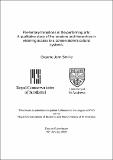Files in this item
Pre-tertiary transitions in the performing arts : a qualitative study of the tensions and hierarchies in widening access to a conservatoire's cultural systems
Item metadata
| dc.contributor.advisor | Broad, Stephen | |
| dc.contributor.author | Smillie, Graeme John | |
| dc.coverage.spatial | 428 p. | en_US |
| dc.date.accessioned | 2021-06-29T10:25:45Z | |
| dc.date.available | 2021-06-29T10:25:45Z | |
| dc.date.issued | 2021-06-28 | |
| dc.identifier.uri | https://hdl.handle.net/10023/23438 | |
| dc.description.abstract | This study investigates the lived experiences of students on ‘Transitions 20/40’, a pre-tertiary widening access initiative at the Royal Conservatoire of Scotland. Transitions 20/40 funded participants from statistically identified deprived areas in Scotland to attend ‘Junior’ conservatoire and short course programmes. This thesis aims to improve understanding of the implicit and explicit ways conservatoire cultures may exclude individuals from these under-represented backgrounds. The research explores the social and cultural conditions of conservatoire participation and asks if facilitating student participation in existing pre-tertiary structures is enough to meaningfully widen participation to the institution. The research also investigates how the Conservatoire can diversify its cultures, practices and priorities to include more diverse students, and if examples of good practice are already seen across different artistic disciplines. Semi-structured interviews were conducted over a four-year period with a sample of 47 student participants across the disciplines of music, drama, dance, production and screen. The tools of Pierre Bourdieu informed the data collection and are used to conceptualise learner trajectories from peripheral positions as they move towards full participation in the Conservatoire. Analysis shows that participants who continued into undergraduate study found legitimised institutional practices that reflect their prior learning, valued their existing social and cultural capital and allowed them to focus on their creative practice. Those who had learned their creative practice outside of specific conservatoire adherent cultural systems experienced a dissonance, and laboured to gain social and cultural legitimisation there, often undertaking a degree of expectation and identity reformulation as part of Transitions 20/40. This discussion challenges the institution to connect with more diverse communities of practice, build further on the bespoke learning opportunities extended to students in Transitions 20/40, and further embed the widening participation agenda as a core institutional priority, to better reflect the broader society in which the Conservatoire is situated. | en_US |
| dc.description.sponsorship | "This work was supported by a part-time PhD studentship provided by the Royal Conservatoire of Scotland and the Scottish Funding Council as part of the funding agreement for Transitions 20/40." -- Funding | en |
| dc.language.iso | en | en_US |
| dc.subject.lcc | PN1578.S3S6 | |
| dc.subject.lcsh | Performing arts--Study and teaching--Social aspects | en |
| dc.subject.lcsh | Students--Scotland--Glasgow--Interviews | en |
| dc.subject.lcsh | Education, Higher--Social aspects--Scotland | en |
| dc.subject.lcsh | Marginality, Social--Scotland | en |
| dc.subject.lcsh | Royal Conservatoire of Scotland | en |
| dc.title | Pre-tertiary transitions in the performing arts : a qualitative study of the tensions and hierarchies in widening access to a conservatoire's cultural systems | en_US |
| dc.type | Thesis | en_US |
| dc.contributor.sponsor | Royal Conservatoire of Scotland | en_US |
| dc.contributor.sponsor | Scottish Funding Council | en_US |
| dc.type.qualificationlevel | Doctoral | en_US |
| dc.type.qualificationname | PhD Doctor of Philosophy | en_US |
| dc.publisher.institution | The University of St Andrews | en_US |
| dc.publisher.department | Royal Conservatoire of Scotland | en_US |
| dc.identifier.doi | https://doi.org/10.17630/sta/79 |
This item appears in the following Collection(s)
Items in the St Andrews Research Repository are protected by copyright, with all rights reserved, unless otherwise indicated.

